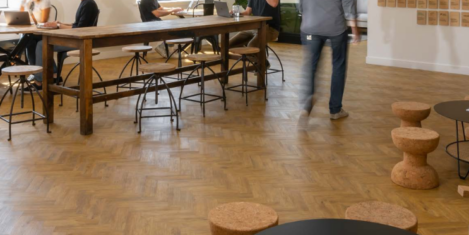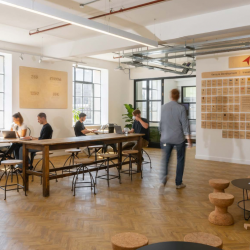January 13, 2023
How the 21st Century office was born in post war Europe
 There was a curious addition to a 2016 report on the Top 10 Technologies Driving the Digital Workplace from tech researchers Gartner. It wasn’t a technology at all but rather a slightly obscure office design concept that originated in Hamburg in the late 1950s, but which tells us a lot about how we work in the 21st Century office, according to Gartner. Its history lies with the German consulting firm Quickborner. Led by the brothers Eberhard and Wolfgang Schnelle, the firm applied the egalitarian principles of the post war world and rejection of the scientific management theories that had created the familiar factory-like rows of desks that had come to dominate open plan offices to create something more in tune with the new age.
There was a curious addition to a 2016 report on the Top 10 Technologies Driving the Digital Workplace from tech researchers Gartner. It wasn’t a technology at all but rather a slightly obscure office design concept that originated in Hamburg in the late 1950s, but which tells us a lot about how we work in the 21st Century office, according to Gartner. Its history lies with the German consulting firm Quickborner. Led by the brothers Eberhard and Wolfgang Schnelle, the firm applied the egalitarian principles of the post war world and rejection of the scientific management theories that had created the familiar factory-like rows of desks that had come to dominate open plan offices to create something more in tune with the new age.


















 All of humanity’s problems,” the French scientist and philosopher Blaise Pascal wrote in 1654, “stem from man’s inability to sit quietly in a room alone.” He may have been right, but then again, sitting in a room alone isn’t necessarily a great state of permanent being either. There was a time we used to talk with dismay about the Japanese phenomenon of intense social distancing known as hikikomori. We would consider with horror the isolation, lack of engagement with society, poor mental health and loneliness of the people who had almost completely withdrawn to their rooms. Those poor bastards locked up in enclosed spaces linked to the outside world only by screens.
All of humanity’s problems,” the French scientist and philosopher Blaise Pascal wrote in 1654, “stem from man’s inability to sit quietly in a room alone.” He may have been right, but then again, sitting in a room alone isn’t necessarily a great state of permanent being either. There was a time we used to talk with dismay about the Japanese phenomenon of intense social distancing known as hikikomori. We would consider with horror the isolation, lack of engagement with society, poor mental health and loneliness of the people who had almost completely withdrawn to their rooms. Those poor bastards locked up in enclosed spaces linked to the outside world only by screens. 















December 13, 2022
Getting past the uncertainty of GDP to find something better
by George Muir • Business, Comment, Everything Omni, Wellbeing